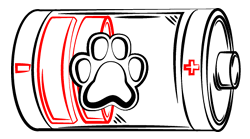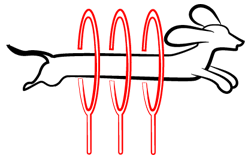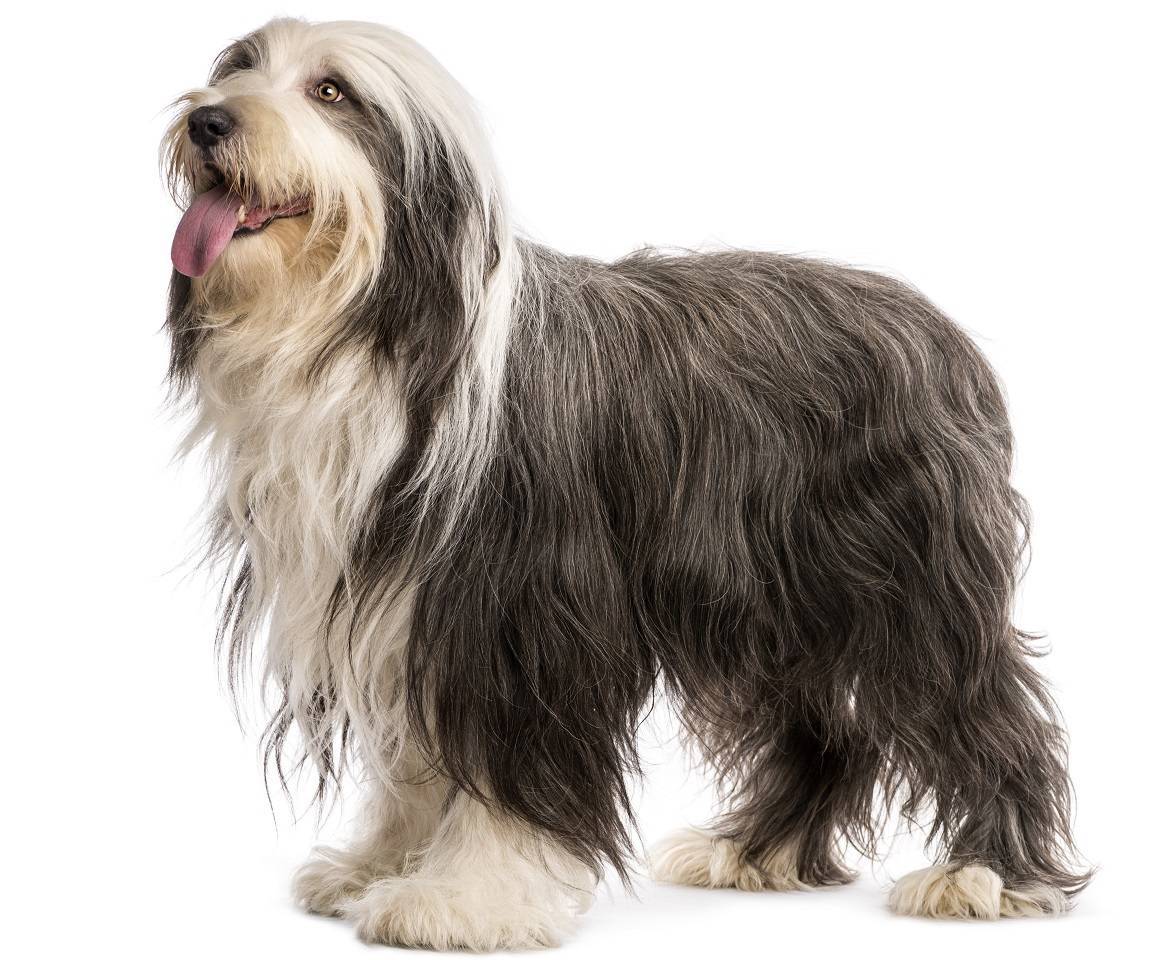
Paws ‘N’ Pups Quickview
Size
| Energy Level
| Trainability
| Paws ‘N’ Pups Rank
|
Characteristics
| Physical Characteristics: Height: 20-22” Weight: 45-65 lbs. Energy Level: Moderate | Colors: The American Kennel Club recognizes the Bearded Collie in the following colors:
|
Health & Longevity
Average Life Span: 12-14 years
Bearded Collies are generally very healthy and are considered a largely unspoiled breed, meaning breeders have gone to great lengths to protect the breed. Although most Bearded Collies have little to no health problems, there are some issues that may occur.
The most common health problem for the Bearded Collie is hypothyroidism, a condition in which the thyroid produces unusually low hormone levels. Symptoms can include infertility, obesity, low energy, droopy eyelids, and irregular heat cycles. Good quality of life is still likely for a dog with hypothyroidism, but daily medication will be required for the duration of his life.
Hip dysplasia, a genetic condition in which the thighbone does not fit properly into the hip joint, can also occur in Bearded Collies. Although the condition is hereditary, onset can be triggered by injuries caused from jumping or falling as well as overly rapid growth caused by a high calorie diet. Bearded Collies with hip dysplasia should not be bred.
In some cases, Bearded Collies may also suffer from eye disease. One such disease is Progressive Retinal Atrophy (PRA), a degenerative disease that will eventually result in blindness. Another potential eye issue is Persistent Pupillary Membrane (PPM), in which strands of tissue from the fetal membrane remain in the eye after birth. These strands usually break apart by five weeks, but veterinarian prescribed eye drops may help if this is not the case. If the issue is not addressed, PPM can lead to cataracts or corneal opacities, in which scarring or clouding of the cornea causes vision to worsen.
Other health issues impacting some Bearded Collies include elbow dysplasia, allergies, and a skin condition called pemphigus follicaceus that results in the formation of blisters. Epilepsy and
heart disease may occur in some cases.
Despite the possibility of these health problems, the vast majority of Bearded Collies are extremely healthy, and the breed has a long lifespan. Most Bearded Collies live 12 to 14 years, though living even longer is not uncommon for this breed.
Temperament & Train-ability
The Bearded Collie is a herding breed: athletic, intelligent, and agile. They are known for being boisterous and bouncy with a great sense of humor. On occasion, they can be rowdy and tend to jump on people, especially as puppies. A Bearded Collie should not be left alone or cooped up indoors for long periods of time; he will become destructive and bark excessively. However, the typical Bearded Collie is friendly to everyone they meet, even other animals. Although playful and friendly, the Bearded Collie can be headstrong and independent.
The Bearded Collie is not an ideal dog for apartment life. They should live indoors, but they require an outdoor space for running and exercise. They love outdoor play in all weather conditions and need daily exercise such as running, ball games, or going for long walks. The playful Bearded Collie is excellent with older children, although their exuberance may overwhelm toddlers.
Training a Bearded Collie can be challenging. They are intelligent, athletic working dogs and capable learners. They excel in dog sports like rally, agility, obedience, and herding. However, they are stubborn at times and may grow bored easily. It is important to begin socialization and training with a Bearded Collie immediately. They are passionate about chasing and herding and need to learn to use these behaviors appropriately. With an early start to training, the Bearded Collie’s intelligence and athleticism can yield great results.
Train your Bearded Collie with positive reinforcement and encouragement. Use favorite treats, praise, or extra play time as incentives. Do not be harsh or overly critical of a Bearded Collie. They will not thrive or succeed under harsh conditions. Bearded Collies are highly sensitive to emotion and may shut down or give up if they sense that you are irritated or angry. If they are not successful after several attempts, they may become frustrated and not want to continue, so encouragement and praise are key. It is also necessary to make training fun for your Bearded Collie and to vary your methods. Otherwise, he will become bored and distracted.
Grooming
A commitment to grooming is required for a Bearded Collie owner due to the breed’s harsh, shaggy coat. Meant to protect him from extreme weather in Scotland, the Bearded Collie’s coat is long and thick. Be prepared for your dog to shed, although this can be somewhat alleviated with frequent grooming. The breed does shed heavily once a year for two to four weeks, and more frequent grooming is needed during this time period to control the amount of loose hair. Bearded Collies need to be brushed at least weekly, sometimes daily. Expect to spend half an hour to an hour brushing your dog each week. To remove tangles and reduce shedding, a bristle or pin brush is recommended. Use a condition spray and/or an anti-tangle spray to combat mats and to prevent hair breakage and damage. Expect the Bearded Collie’s furry feet and shaggy coat to track in dirt, mud, water, and debris regularly. Keeping the coat trimmed can prevent this from becoming excessive.
Bathe your Bearded Collie as needed, typically every 6-8 weeks. Brush teeth at least two to three times weekly to eliminate tartar buildup and the resulting bacteria. Trim nails weekly or monthly as needed. You will know it is time to trim your dog’s nails when they make a clicking sound as he walks. Check ears regularly for wax buildup, foul odor, and debris in order to avoid infection.
Diet
The recommended daily feeding amount for an adult Bearded Collie is 1.5 to 2 cups of high quality dog food. Growing puppies require 3-4 cups daily. Remember that the amount and type of dog food for your adult dog depends on a variety of individual factors such as metabolism, size, exercise level, and age. Avoid overfeeding by dividing food into at least two daily meals. Ensure your Bearded Collie always has a supply of fresh, clean drinking water.
Looking for a Bearded Collie?
 Find A Bearded Collie Breeder |  Bearded Collie Puppies For Sale |  Adopt A Bearded Collie |
Cost
Bearded Collies are an expensive breed, and a well-bred puppy will typically cost at least $1200, with prices sometimes going as high as $2500. Cost depends on factors including location of breeder, gender of puppy, titles his parents have, and whether the pup is likely to be a show dog or a house pet.
Paws ‘N’ Pups Ranking
Paws ‘N’ Pups ranks every breed out of 4 with 1 being easiest to integrate into your life and 4 being the toughest – The lower the ranking the better.
Ranking takes into account a few basic factors including cost, skill level needed, high vs low maintenance and how critical regular training is to success. The Bearded Collie ranks a 3. They are intelligent, friendly, and fun companions who get along with people and animals alike and generally have few health problems. However, their coat requires extensive care and they do tend to shed and track debris. They can be stubborn and rowdy and will become destructive if left alone for long periods of time.
Breeds Similar To Bearded Collie
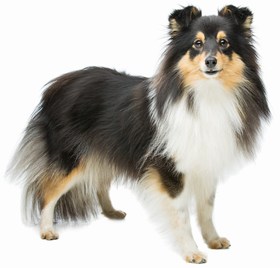 Shetland Sheepdog | 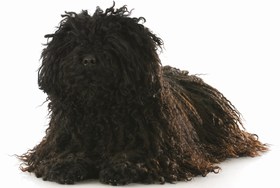 Puli | 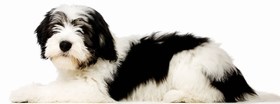 Polish Lowland Sheepdog | 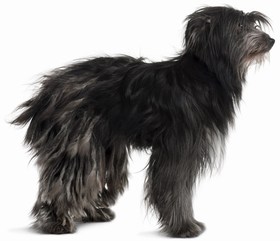 Pyrenean Shepherd |


